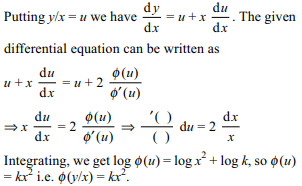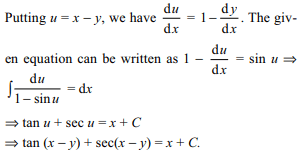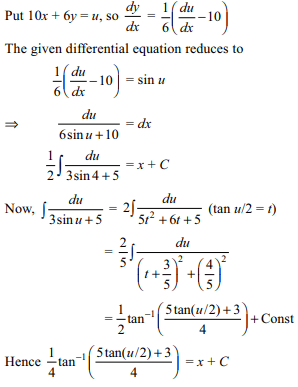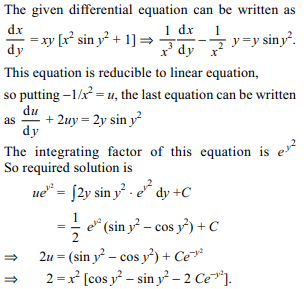1. The solution of differential equation
\[\frac{dy}{dx}=\frac{y}{x}+2\frac{\phi\left(y/x\right)}{\phi'\left(y/x\right)}\]
is
a) \[x^{2}\phi\left(y/x\right)=k\]
b) \[y^{2}\phi\left(y/x\right)=k\]
c) \[\phi\left(y/x\right)=kx^{2}\]
d) \[\phi\left(y/x\right)=ky^{2}\]
Explanation:

2. The degree of the differential equation of all curves
having normal of constant length C is
a) 1
b) 3
c) 4
d) 2
Explanation:

3. The solution of the equation
\[\frac{dy}{dx}=\sin\left(x-y\right)\] is
a) \[y+\cot\left(\frac{x-y}{2}\right)=c\]
b) \[x+\cot\left(\frac{x-y}{2}\right)=c\]
c) \[x+\tan\left(\frac{x-y}{2}\right)=c\]
d) none of these
Explanation:

4.Equation of the curve passing through the origin
satisfying \[\frac{dy}{dx}=\sin\left(10x+6y\right)\]
is
a) \[\tan^{-1}\left(\frac{5\tan \left(5x+3y\right)+3}{4}\right)=4x+\tan^{-1}\frac{3}{4}\]
b) \[\sin^{-1}\left(5x+3y\right)=x^{2}\]
c) \[\tan^{-1}\left(10x+6y\right)=5x+3y\]
d) \[\tan^{-1}\left(\frac{5\tan \left(5x+3y\right)+2}{4}\right)=5x+\tan^{-1}\frac{1}{2}\]
Explanation:


5. The particular solution of log
\[\frac{dy}{dx}=3x+4y,y\left(0\right)=0\]
is
a) \[e^{3x}+3e^{-4y}=4\]
b) \[4e^{3x}-e^{-4y}=3\]
c) \[3e^{3x}+4e^{4y}=7\]
d) \[4e^{3x}+3e^{-4y}=7\]
Explanation:

6. The solution of the differential equation
\[\frac{dy}{dx}=\frac{1}{xy\left[x^{2}\sin y^{2}+1\right]}\]
is
a) \[x^{2}\left(\cos y^{2}-\sin y^{2}-2c e^{-y^2}\right)=2\]
b) \[y^{2}\left(\cos x^{2}-\sin y^{2}-2c e^{-y^2}\right)=2\]
c) \[x^{2}\left(\cos y^{2}-\sin y^{2}- e^{-y^2}\right)=4\]
d) \[x^{2}\left(\cos y^{2}-\sin y^{2}\right)=2c e^{-y/2}\]
Explanation:

7. The differential equation corresponding to the family
of curves \[y=e^{x}\left(a\cos x+b\sin x\right)\] , a and b being
arbitrary constants is
a) \[2y_{2}+y_{1}-2y=0\]
b) \[y_{2}-2y_{1}+2y=1\]
c) \[2y_{2}-y_{1}+2y=0\]
d) \[y_{2}-2y_{1}+2y=0\]
Explanation:

8. The solution of \[y^{5}x+y-x\frac{dy}{dx}=0\]
is
a) \[x^{4}/4+1/5\left(x/y\right)^{5}=C\]
b) \[x^{5}/5+1/4\left(x/y\right)^{4}=C\]
c) \[\left(x/y\right)^{5}+x^{4}/4=C\]
d) \[\left(xy\right)^{4}+x^{5}/5=C\]
Explanation:

9. The equation of the curve passing through (3, 9) which satisfies \[dy/dx=x+1/x^{2}\]
is
a) \[6xy = 3x^{2} - 6x + 29\]
b) \[6xy = 3x^{2} - 29x + 6\]
c) \[6xy = 3x^{3} + 29x - 6\]
d) \[6xy = 3x^{3} - 29x + 7\]
Explanation:

10.The solution of\[\frac{x d y}{x^{2}+y^{2}}=\left(\frac{y}{x^{2}+y^{2}}-1\right)dx\]
is
a) y = x cot (c - x)
b) \[\cos^{-1} y/x = -x + c\]
c) y = x tan (c - x)
d) \[y^{2}/x^{2}=x \tan \left(c-x\right)\]
Explanation:
